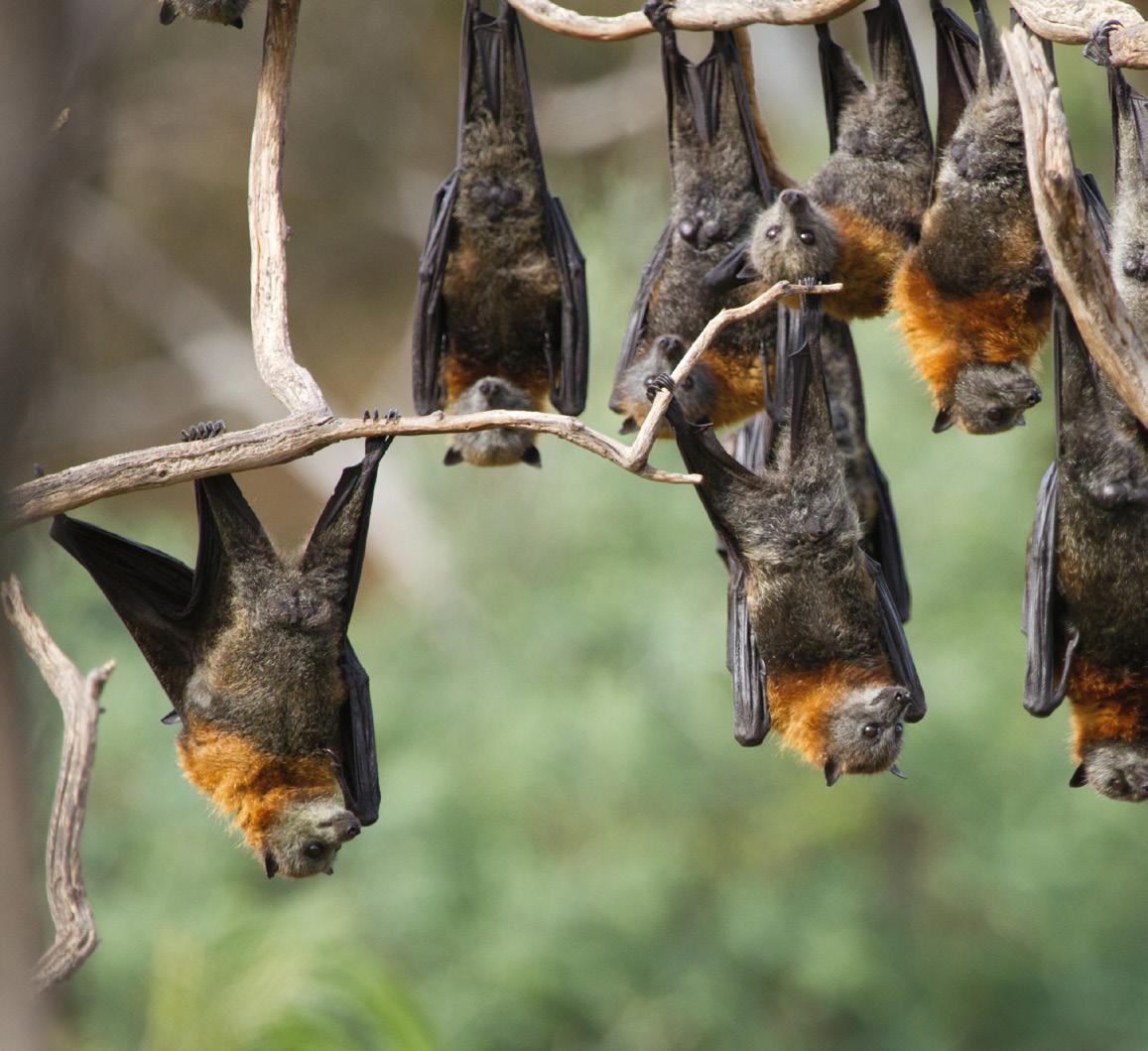
3 minute read
Environment - Flying foxes continue to decimate farming income
They’re being touted as the source of a global pandemic, but for horticulturalists in New South Wales, damage from bats hits much closer to home.
Words ALEXANDRA BUNTON
As flying foxes move further inland in search of food, growers are fighting an ongoing battle to protect their orchards from significant damage. In 2017, some growers reported up to 100 per cent loss of fruit from flying foxes.
Chris Stillard, a persimmon grower from Barooga in the Riverina region, first noticed the impact of flying foxes four years ago. “The second year we had them, I lost around 10 per cent of my crop and another five per cent had damage on the fruit,” Chris says.
“They try to pull the fruit off the tree, then they will fly to a higher tree and eat the fruit. If they can’t pull it off, they will eat it on the tree and leave just the calyx.”
Chris says that drought conditions have driven flying foxes to new regions in search of native food, pushing them into areas that haven’t had bats before. The animals leave a trail of destruction in their wake – not just in crop damage but causing stress and sleepless nights to farmers.

NET RESULT: A netting program is seen as the only solution to stopping the significant impact of flying foxes that are protected under environment law.
“There’s definitely a mental health impact when a farmer has nurtured a crop to the point of harvest, only to see it damaged from a pest we previously didn’t have to deal with,” Chris says.
“Financially, we’re impacted by missing fruit and a significant percentage of marked fruit, which is generally thrown out due to health concerns.”
Growers have limited options to deal with flying foxes, which are protected under environmental law. A small number of landholders have licenses to shoot the animals, but these expired at the end of June 2020.
Netting is the only real solution, Chris says.
“You can keep them moving at night with a scare gun, but your neighbours would hate it.”
Depending on the level of protection needed, flying fox exclusion netting can cost from $50,000 to $100,000 per hectare. For many growers dealing with the ongoing impacts of drought, bushfire and Coronavirus, this cost is simply unaffordable.
Previously, a popular staterun flying fox netting scheme provided assistance to growers severely impacted by flying fox incursions through a rebate for netting that protects the crops and reduces the risk of harm to the animals.
NSW Farmers is asking the state government to reinstate the netting program on a dollar-fordollar basis, providing assistance for the remaining un-netted orchards in NSW.
Guy Gaeta, who Chairs the NSW Farmers' Horticulture Committee, installed $80,000 worth of netting under the program. An apple and cherry grower in Orange, he’s been seeing damage from flying foxes in his region for the last 15 years.
“When they’re feeding, they scatter everywhere,” Guy says. “They’ll keep going back to certain places if you’re not scaring them away. They’ll come back to the same tree every night and they’ll take any bit of fruit.
“I know a local grower who has lost over 200 tonnes of apples to flying foxes, that were going to go into apple pies for McDonalds. It impacts the food system and if there’s less fruit, it can increase the price that consumers pay.”

NET RESULT: A netting program is seen as the only solution to stopping the significant impact of flying foxes that are protected under environment law.
Guy has been lobbying the state government to reinstate the netting program since it wound up in 2017, but he feels that his appeals have fallen on deaf ears. Growers say that they’ve been ignored, and that government doesn’t want to talk about management options.
“I’m very disappointed – we’ve been told different stories by ministers,” Guy says.
“You cannot expect one of the lowest-paid professions in this country to wear the full cost of environmental rules. If the government protects flying foxes because they’re endangered, what are we supposed to do when they ruin our crop? They cost us hundreds of thousands of dollars in income.”
In 2019, Member for Calare Andrew Gee announced $2.5 million to assist growers in Orange, Bathurst, Mudgee and Cowra with flying fox netting. Despite efforts from Gee to follow up on the funding, Guy says that any mention of the program disappeared after the last change in the Federal ministry.
“Why does the government expect growers to sacrifice fruit to feed flying foxes? We don’t grow food for bats, we grow it to feed the Australian public so we can make a few dollars and keep our farming businesses alive.”










